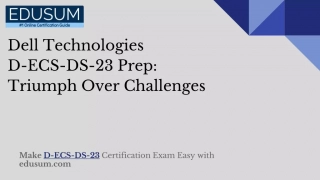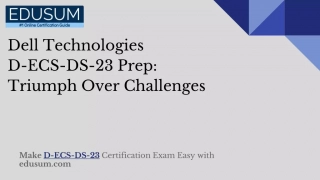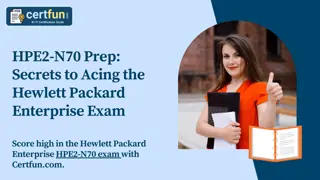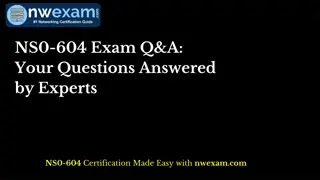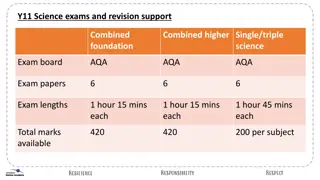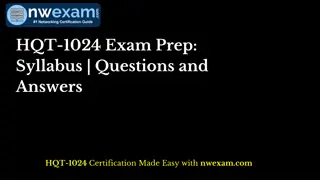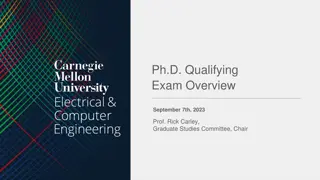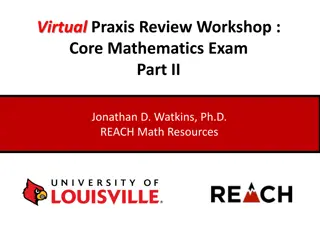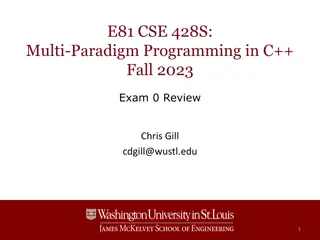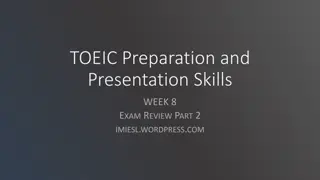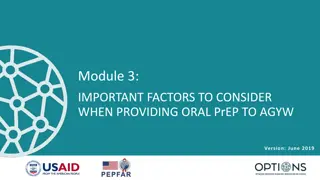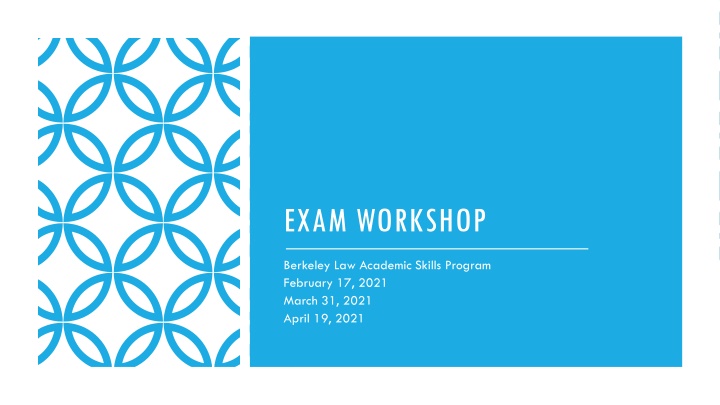
Effective Law School Exam Strategies and Techniques
Enhance your legal exam performance with these comprehensive strategies focusing on identifying legal issues, applying rules, and performing legal analysis. Learn about different types of law school exam questions and develop a successful exam-taking process.
Download Presentation

Please find below an Image/Link to download the presentation.
The content on the website is provided AS IS for your information and personal use only. It may not be sold, licensed, or shared on other websites without obtaining consent from the author. If you encounter any issues during the download, it is possible that the publisher has removed the file from their server.
You are allowed to download the files provided on this website for personal or commercial use, subject to the condition that they are used lawfully. All files are the property of their respective owners.
The content on the website is provided AS IS for your information and personal use only. It may not be sold, licensed, or shared on other websites without obtaining consent from the author.
E N D
Presentation Transcript
EXAM WORKSHOP Berkeley Law Academic Skills Program February 17, 2021 March 31, 2021 April 19, 2021
TYPES OF LAW SCHOOL EXAM QUESTIONS ISSUE-SPOTTER ( ESSAY ) QUESTIONS MULTIPLE-CHOICE QUESTIONS POLICY QUESTIONS
ISSUE-SPOTTER QUESTIONS What skills are tested? 1. Identify the legal issues 2. Identify the rules relevant to resolving the legal issues 3. Perform legal analysis apply the law to the facts
Identify all of the legal issues 1. IDENTIFY THE LEGAL ISSUES Demonstrate an understanding of which legal issues (or sub-issues) are difficult and which are easy Spend more time/space on the difficult issues (where the facts cut both ways) and far less time on the easy issues (where the conclusion is obvious)
State the rule(s) and sub-rules relevant to resolving the legal issues 2. IDENTIFY THE RELEVANT RULES Organization: use IRAC structure with mini-IRACs for sub-rules Use terms of art; avoid paraphrasing
Apply Apply the rule(s) to the facts Identify the facts that are relevant to resolving the legal issue Identify 3. PERFORM LEGAL ANALYSIS Discuss Discuss the relevant facts in detail Explain why the facts matter and why they point to one conclusion or the other ( So what? ) Explain Compare Analogize to and distinguish relevant cases
DEVELOP A PROCESS Read the prompt Read the question or prompt Read the fact pattern Read the fact pattern once all the way through without taking notes Read it again Read the fact pattern again and note the issues, underline key facts, etc. Outline your answer in your exam document. Use headings for issues and sub-issues. Organize issues chronologically. Outline your answer Use the IRAC structure. Discuss the facts in detail. Include case comparisons and policy considerations. Use short sentences and short paragraphs. Write out your answer
IRAC VS. CREAC IRAC (exams) CREAC (memos or briefs) Issue Conclusion Rule Rule Explanation Application Application Conclusion Conclusion
STRUCTURE: IRAC WITH MINI-IRACS Issue Rule: If X and Y, then rule is met. Sub-Issue X Rule Application Conclusion Sub-Issue Y Rule Application Conclusion Overall Conclusion
1. Dont just list the argument (Plaintiff will argue X, Y, Z. Defendant will argue A, B, C. ) Do the analysis. 2. State the obvious. Take what is implicit and make it explicit. KEY TIPS 3. Show your work! Conclusions must be supported by a detailed analysis of the facts. 4. Consider all of the facts and reconcile conflicting facts. Explain your conclusion. 5. Use case comparisons to guide your thinking.
MULTIPLE-CHOICE QUESTIONS Less common on take-home exams Typically mini-issue-spotter questions For mini-issue-spotter/fact application questions, do IRAC on scratch paper and then look for the conclusion in the answer For other types of questions, read all of the answer choices, eliminate wrong answers, and then select the best remaining answer Answer every question, even if you must guess (after eliminating wrong answers) Read slowly and carefully
POLICY QUESTIONS Short essay format Asks you evaluate rules rather than apply them Both descriptive and normative arguments Typical questions: A quote that takes a position agree or disagree Discuss Proposed new rule Implications of a doctrinal shift
HOW TO PREPARE FOR POLICY QUESTIONS Pay close attention in class and take notes on policy discussions In your outline, consider the policy considerations underlying every rule What is the reason for or purpose of the rule? Is the rule effective? FIEP Fairness, Incentives, Efficacy, Process Focus on the policy considerations discussed in class
FAIRNESS, INCENTIVES, EFFICACY, PROCESS Fairness Does this make the victim whole? Is there fair notice? Does this feel fair? Is this fair to the defendant? Is it proportional? Whom does this rule advantage/disadvantage and how? Disproportionate impact on a particular group? Incentives & Efficacy Does the rule effectively carry out the intended purpose? What behavior would this rule deter? What behavior does this rule incentivize? Could this have perverse incentives? How would this impact insurance? Process Is this judicially efficient? Is the jury equipped to resolve this issue? Would this dramatically increase the number of claims? What sorts of resources would need to be expended? Has the rule been fairly applied in practice?
SAMPLE ANSWER STRUCTURE 1 2 3 Discuss/evaluate the old/current rule or the author s position (use FIEP) Discuss/evalaute the new rule or a contrasting position (use FIEP) Take a position and explain the reasons for your position (use FIEP)
PREPARING FOR EXAMS Do the reading, but do it efficiently Make time in your weekly schedule for reviewing and outlining Make short hypos part of your review process In April, start doing full-length practice exam questions When in doubt, practice! Use hypos and practice exams to learn and understand the rules, not to test yourself once you already know them
Prepare for open-book exams as if they were closed- book Create a checklist of issues to make sure you don t miss or forget anything Stay within the time limits for each question. If time limits are not provided, allocate time for each question. TAKING OPEN- BOOK EXAMS Develop a system for how to approach different types of exam questions and practice your system Make sure you know your professor s policy on cutting-and-pasting or retyping directly from an outline Do not copy/paste or retype directly from any source other than materials you created yourself
TAKE CARE OF YOURSELF GET LOTS OF SLEEP MAKE TIME FOR MOVEMENT CONNECT AND COMMUNICATE WITH LOVED ONES VISIT NATURE
Take a few deep breaths Acknowledge how you are feeling DAILY MINDFULNESS Connect with that emotion without judgment name your feelings and welcome them Extend compassion to yourself and others
RESOURCES Where can you find hypos and practice exam questions? Academic Skills Program website Where can you find more tips and advice? Academic Skills Program website Who can help? Academic Skills Program (ASP Fellows, Senior ASP Fellow Haley Johnson, Prof. DiGennaro); Student Services; Berkeley Law Staff Psychologists; Tang Center

